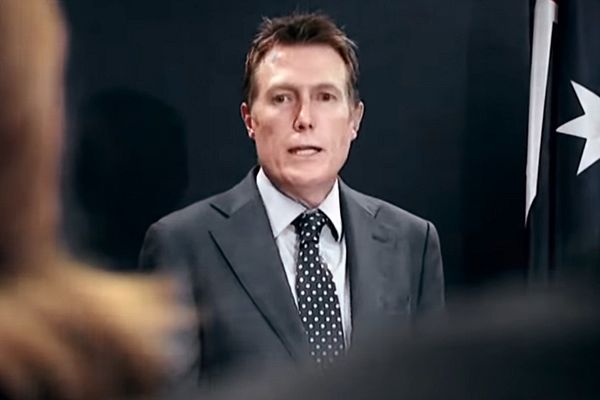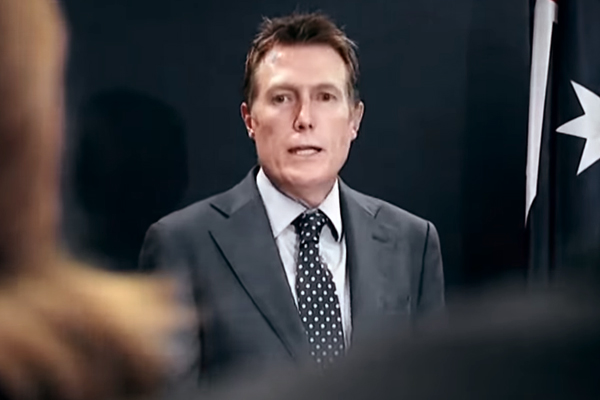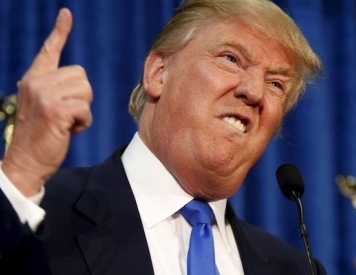Tomorrow, it will be 25 years since the infamous Hoddle Street massacre in Melbourne. Contributing editor-at-large Tess Lawrence’s series of prison interviews with the infamous mass murderer, Julian Knight, are chilling accounts of evil.
Julian Knight is a renowned media whore.
I am no psychologist, and have not seen Knight in person for decades, but some of those who have attest that he continues to relish the notoriety his cowardly murders have brought to his prison door.
To say he is self-obsessed is an understatement.
Even when being interviewed about Knight, as I was on Fran Kelly's ABC Breakfast (Radio National) some years ago, on the anniversary of the massacre, I remain mindful of the continued hurting of our community.
I understand that some survivors still have to wrestle with bureaucracy in terms of medical and financial support and compensation. So many lives have been derailed.
Some feel Knight has forfeited any rights to privileges — even redemption and rehabilitation. That he is beyond forgiveness.
But Justice has to stand between him and vengeance.
THE DARK KNIGHT RISES ON THE VIAGRA OF VIOLENCE (Part 2)
Knight's manipulative powers are persistent. He has played certain media groups off against one another – individual journalists as well – presuming them beholden, after he grants an audience. Some of them have been providing a convenient extension to Knights own PR machine.
You got to remember, Tess, I was a kid when I did Hoddle St. I was only nineteen. I'd led a really sheltered life. Always been in institutions. Family, School, La Trobe Uni, Duntroon. Always been protected. Insulated. What chance had I ever had in life. I'm never going to even get the chance to live. What sort of life is this. I've never really lived out there in the real world. I've never had a taste of real living.
Maybe not, but Julian Knight had a taste for death. His personal profile, presented both inside and out of the courtroom, presents us with the spectre of an extremely disturbed young man.
I've sat opposite him in prison and I've sat opposite him in Court and I have wondered if somewhere in the mental DNA of Julian Knight, his destiny was pre-ordained — or was he simply a child of society's own making? The living manifestation of certain chancres. Did we create him in our own image and likeness?
His scenario goes like this. While a baby, he was adopted by Ralph and Pamela Knight. Knight senior was a career soldier, later promoted to Major. There were two other children. The family was posted throughout Asia and Australia.
Julian idolised his father; wanted so much to be like him. To please him. To be a high achiever. A good soldier.
Julian was twelve years old when his parents separated. He never recovered from what he deemed an emotional severance from the person whose love and respect he most craved.
Major Knight left the family home, later remarried and now lives in Townsville. Julian's obsessive interest in guns and all things military accelerates.
His transition from child to teenager is not a happy one. He has difficulty communicating with others. He feels socially inept. He is. He suffers from poor esteem. He joins the Army cadets, the Army Reserves, and eventually, after a stint at uni, Duntroon...all the while, waging war on himself.
He drinks and fights a lot. One of his contemporaries at Duntroon says of him:
The thing is, Julian was never going to be a good soldier. He didn't have the leadership qualities or the discipline. He couldn't hack it."
He had this image of his father that he had to live up to. And he had this chip on his shoulder, like we thought he wasn't good enough, and frankly, he wasn't. You couldn't go out and die for this man. You just wouldn't trust his judgement.
He knew all the technical stuff, but there's more to being a good soldier and a leader than that.
He wasn't the sort of bloke who could command others. Other blokes just couldn't look up to him. He was a wimp. A big man when he had a big gun in his hand. He was a Rambo soldier, you know, the type you see on the screen — one man against the world sort of thing.
I'll tell you something, he was a coward. That's why he was picked on. Scared shitless he was.
We gave him hell, but then we give a lot of the blokes hell and they don't go around killing people on street corners.
He was always going on about his father being a Major, as if that gave him special privileges.
So what. A lot of us have high ranking relatives...another thing was, he just didn't have that certain polish, or social awareness. He wouldn't know crystal from glass, d'you know what I'm saying.
He didn't know about etiquette and he was out of his depth at some of the social 'do's' in Canberra.
He never looked the part, even in uniform; looked more like a boilermaker or a fitter and turner, which he should have been.
Trouble was, he was looking for a war. He was always saying he wished one would start in Australia. Well, he started his own war. The thing is, he fought a coward's war, didn't he. Civvie street is no war zone.
I reckon his shit would have turned yellow if he'd been in a real war, in say, 'Nam, fighting real soldiers.
What he did was a terrible thing. Don't you believe all that shit he tells you about the Army training you to kill.
I know he says he went into a killing mode that night, and that's shit. The last thing Duntroon does is teach you that sort of thing. And I want to tell you something anyway: that wasn't killing — that was murder. The Army might teach us to kill, but it doesn't teach us to murder. There is a difference. And every soldier will know what I'm getting at.
Not one of us were surprised when we found out it was Knight. He was a real sicko and he was one of our worst mistakes. I'd say our worst to date. He should never have had access to any guns. I read that he was keeping one last bullet for himself. I don't believe that.
That guy would never hurt himself. He thinks he's top gun. He was always trying to pretend he was something he wasn't. He'd try and shove all these theories he had about soldiering down our throats. He only ever had influence over people who were not as intelligent as most. If he'd stayed in civvie street, he'd be hanging around with the local riff-raff, the losers.
You couldn't really get near to him. There wasn't any warmth about the man. He had only one dimension to him, and he was full of hate ... maybe not hate, but bitterness. Yes, bitterness. And he was hopeless with the sheilas. Wouldn't know which was was up. A couple of his girlfriends were real scrubbers, you know what I'm saying. He did get a bit of a hard time over that.
As for the bastardisation, well, we all go through it, to varying degrees, I must admit; but the way he's gone on about it, you'd think he went through it every day. Notice how he won't come out and say what actually used to go on. Because all the blokes would fall about laughing. He's using it as a bloody excuse to get sympathy. I wish there was some way we could court martial him. It'll be interesting to see what happens to him about the stabbing episode ... if the Army will follow it up, now that he's got 27 years.
About two months before the Hoddle St massacre, Knight was cited in an incident at a Canberra nightclub. Knight allegedly stabbed a Sergeant Major.
On that evening, Julian had been confined to barracks, but had been ' sprung' at the disco by his superiors.
At a subsequent Army investigation, Knight acquiesced to pressure to resign. It is understood that the police charges over the incident still stand.
This inglorious exit from the Army left Knight humiliated and determined to redeem himself.
Seventy one days later, the redemption of Julian Knight took place in a baptism of gunfire in a lazily trendy suburban alcove known as Clifton Hill.
The Battle of Clifton Hill was Julian Knight's Last Stand. It confirmed his aspiration as a one-man war machine and it ricocheted him from self-loathing and obscurity to the realm of killer-celebrity.
Just before 9.42pm that night, he took up a kneeling position, both to pay his final respects to society and to stabilise his aim.
How many times it has been said of our kind, that we care not for one another — that you could drop dead from a heart attack, on the pavement, and people would step over you. Not that night, they didn't.
Within ten minutes, he had executed six people and wounded nineteen others – pausing for a smoko – bringing them down at the rate of 2.6 per minute, alternating three weapons and discharging about 125 rounds of ammunition.
The air was filled with the wails of police and ambulance sirens — and of the dying and the wounded and those who gathered around them.
Bodies lay strewn all over the place. Truly, it was the slaughter of the innocents, as people rounded the bend into Hoddle St and unwittingly into the killer's sights.
On this night, everyone stopped to help. As they did, Knight struck them down. Before the clock struck ten, he had tattooed his name in bullet holes into Victoria's tragically murderous history with a velocity from which we have yet to recover.
Overhead, spotlights and flashing lights ignited the sky like a false galaxy and moon. Above us, the police chopper shred the night, searching for one or more snipers. Knight was to bring the chopper down with a 40 cent bullet. He still gloats about that one. Police, media and onlookers converged to the war zone.
On the ashpalt floor of this urban jungle lurked the most dangerous enemy of our species — one of our own kind. He said it all when he pumped six bullets into the flesh of his first victim. Melbourne was on red alert. Television and radio programmes kept blitzing news flashes, many of them contradictory.
We didn't know what was going on and we're still wondering why the earth opened up. Within the hour, the police had captured Knight.
That's a fuckin' lie he tells me later in prison. He surrendered. He misplaced the bullet he was saving for himself. This is what shits him about the police, he tells me.
They've always got to be the tough guys, so he's telling me, right here and now, he gave himself up.
Get that?
I don't believe Knight had serious intent to kill himself.
The aftermath is part of his Grand Vision. I have seen him intoxicated with the recollection of his performance that night.
He was great. He shoved it up the Army. He shoved it up the police. And that bloke that touched up his girlfriend's tits. He shoved it up society and every bastard that had ever done him wrong.
Ladies and Gentlemen, I give you the killing machine. And all because he'd had a bad day.
His girlfriend rejected him, his car broke down, and he'd never been breastfed as a baby.
Later, Julian Knight will ridicule the police for not killing him stone dead. From the sanctity of his prison walls, he despatched all manner of theses to all manner of people.
Dossiers of death. Ruthless in their criticism of authority and the lack of military countenance of the constabulary and the special operations group personnel. Not even between the lines is there any real explanation for his actions, or any compassion for those he killed and maimed for life.
He even details the name and address of one of his girlfriends for possible interview. Like his conversation, his written words move no further than the radius of his blind ego.
Nor did the killing stop with Knight's arrest. He boasted of the copycat killings he inspired.
A few days after Hoddle St, a 16 year old St Albans kid killed a taxi driver.
Then, in a sleepy postcard of a village in England, called Hungerford, a killer with a mental profile not dissimilar to Knight liquidated 16 people in what was Britain's worse mass murder.
The terminator's name was Mike Ryan and Knight speaks of him as if he is an old friend; or a pupil who learnt well from the Master Blaster.
But there is one copycat killer who Knight despises. His face curdles when he mentions his name. Less than five months after Hoddle St, an angry young man called Frank Vitkovic took a gun into the Australia Post building on Queen St.
Seventeen minutes later, he hurled himself out of an 11th floor window.
By then, he'd shot dead eight people, wounded and terrorised so many others.
Knight's bloody sphere of influence now totalled 32 dead, dozens wounded and countless shattered families.
Melbourne was starting to smell of decayed corpses.
Remember we were still grieving from the Russell St bombing where a young policewoman, Angela Taylor later died from horrendous injuries.
You shouldn't count Frank Vitkovic, says Knight. The guy was an amateur, know what I mean. What did he know about guns. Just walked in and got one over the counter. Wasn't trained. It was a fluke he took out eight.
A real fluke. Had to be.
Knight's credibility as a professional soldier is compromised by the success of this amateur.
Sure, Frank took out one extra than Knight, remember, he took longer to do the job. Vitkovic wasn't in the same league and don't let anyone try and bluff you that he was.
Inside Knight's mean belly, the jealousy he feels over Vitkovic is gnawing at his stomach lining.
Frank, you see, had so much more publicity, especially at the inquest and the pictures that were subsequently released for publication.
Knight is outraged that the fuckin' media has given so much space to the amateur.
He fights to get his inquest reopened so that he can make a play for equal airtime.
Why do you reckon, Tess, that the public feels more sympathy towards Vitkovic than me.
Is it because he's dead, and they can't get an explanation out of him. Is it because there's no one they can blame.
You know, like with me, they've got someone to point out.
One day, Knight tells me about the nightmares he got when he was coming off prescribed anti-depressants.
When I first came in here, I made the mistake of saying I wish I was dead. It was an off the cuff remark. I was having a down day. They thought I was going to do myself in.
So they shovelled the stuff in me.
One day, he tells me, he was taking heavy sedation for about six weeks. Another time he says it was for six months.
At the moment, he's wide eyed and wide mouthed.
You know, Tess, I reckon I'd go all right out there. (He points to the world.)
I don't think so, Julian, I never want you on the streets again. I don't care if imprisonment does involve rehabilitation.
When you're 47 years old, I don't care to get on the same bus with you or want you anywhere in the local supermarket. I don't care if you can offer a contribution. Save it. I'm not interested in assertions that you have a high IQ.
Whilst sociologists ponder why Melbourne seems to have a proliferation of mass killers, and some suggest the answer lies in our traditional conservatism — there is no doubt there is a disturbing melancholia in our midst.
Our streets have become signposts to murder; roadmaps of mayhem. Place crosses at all of these; Russell St, Queen St, and more recently Walsh St, where two young rooky policemen were executed.
Justice George Hampel, in passing sentence, jailed Knight for life for each of the seven murders with a fixed minimum term of 27 tears.
Knight had pleaded guilty to all charges, including 46 charges of attempted murder.
On that day, Knight's feral appearance faltered only occasionally. He was determined to remain expressionless.
Each time, the courtroom door opened — and he looked around as if expecting someone. His breathing was shallow. His hands clasped in front of his pelvis. Now and again his Adam's Apple would signal his discomfort at the judge's words.
In his green prison tracksuit, he monitored every face in the room.
The 27 years minimum pleased him. Worked out to about 3.85 years per corpse.
Pamela Knight and (another son) sat in the court. She wore a bright white and yellow suit.
A face hued in sorrow, but without concession to emotion. Among the innocents and the casualties, she must be allowed a place.
Though he was the seed not of her womb, but of her heart, he betrayed her. He maimed her with another kind of gun and used another kind of bullet. Hers remains the courage of universal motherhood.
You little punk, Julian Knight. Your war games will continue. You will find succour in your imprisonment and shelter from your own impotence.
It was you who surrendered, but it is we who remain prisoners of the war.
This work is licensed under a Creative Commons Attribution-NonCommercial-NoDerivs 3.0 Australia License









